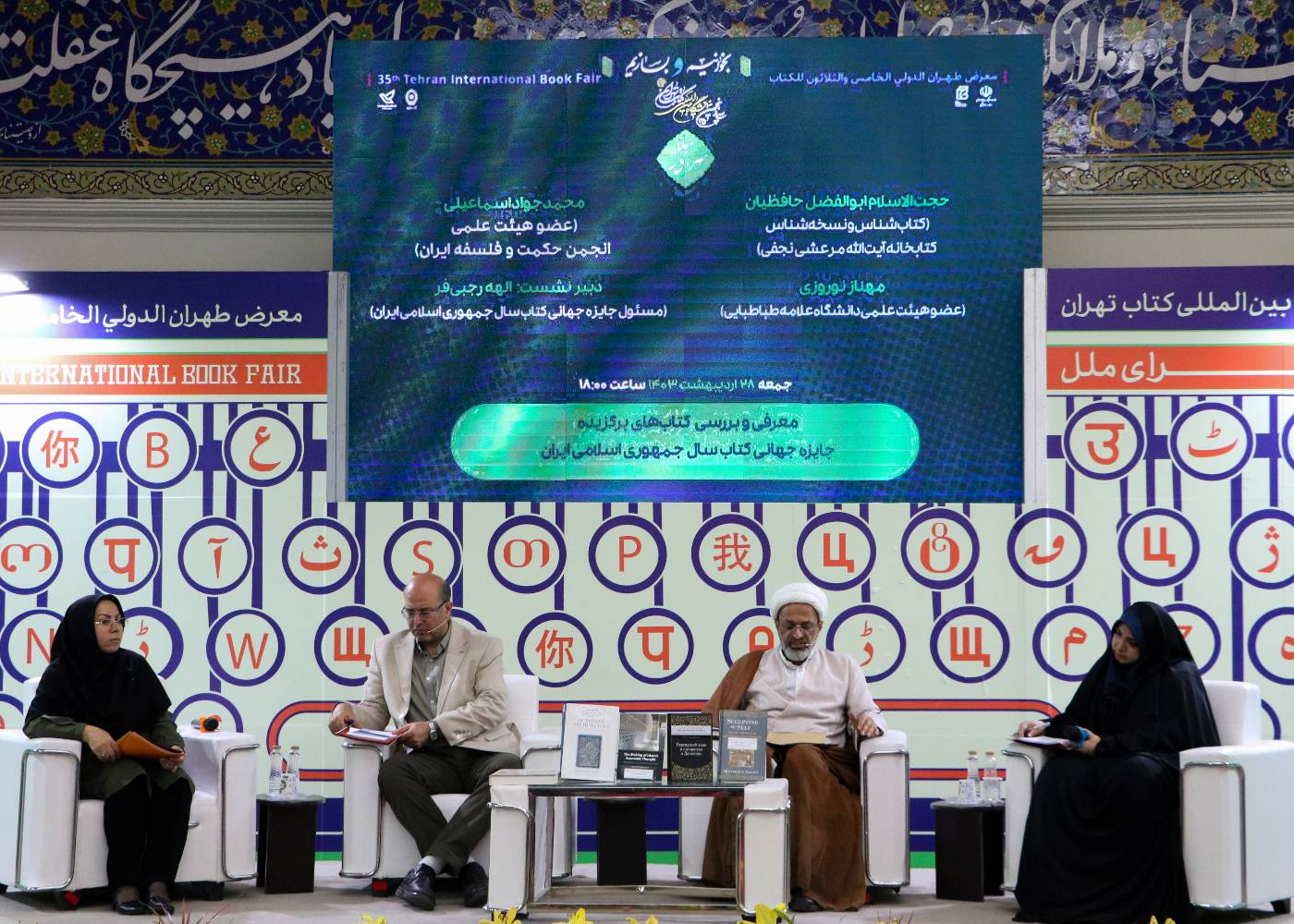
Introduction and Review of Six Award-Winning Books from the Iran World Book Award
2024-05-18 14:01
The introduction and review of the award-winning books of the Iran World Book Award took place on the tenth day of the fair.
According to the news team of the 35th Tehran International Book Fair, the session titled “Introduction and Review of the Award-Winning Books of the Iran World Book Award” was held on May 18, 2024, in the International Hall of the Tehran Book Fair.
In this session, Hojjat al-Islam Abolfazl Hafezian, a bibliographer and manuscript expert at Ayatollah Marashi Najafi Library, Mohammad Javad Esmaeili, a member of the Iranian Society of Wisdom and Philosophy, Mahnaz Norouzi, a faculty member at Allameh Tabataba’i University, and Elaheh Rajabi-Far, head of the Iran World Book Award, provided explanations and insights into the six award-winning books.
"The Hussaini Epic in Collective Memory"
Hojjat al-Islam Abolfazl Hafezian referred to the book "The Hussaini Epic in Collective Memory" by Mohammad Sadegh Boualagh and said: "The author of this book, with an engaging prose, seeks to acquaint the audience with the knowledge of the Ahl al-Bayt and strives to clear the news about the Ahl al-Bayt from distortions."
He mentioned the naming of the book, saying: “The title 'The Hussaini Epic' reflects the author’s revolutionary view of Ashura and indicates that he is not merely aiming to influence the reader emotionally. The term 'collective memory' shows that the author has examined all the reports about Ashura and conveyed them to us."
Hafezian continued: “Boualagh uses a specific style and order to present historical narratives, allowing readers to compare and discern reality from non-reality.”
He added that Boualagh has reviewed 129 works written over 13 centuries about the Ashura movement, making this book highly beneficial for researchers of the Ashura movement.
"The Structure of Islamic Economic Thought"
Elaheh Rajabi-Far discussed the book "The Structure of Islamic Economic Thought" by Sami Al-Dagistani, calling it the result of the author’s doctoral dissertation. She said: "Dagistani addresses the methodological error in the formation of Islamic economic thought and knowledge in the contemporary era."
She continued: "Dagistani considers the main factor in the formation of this approach to be the confrontation between Western Muslim reformist thinkers and believes that the result of this confrontation led to the creation of Islamic economic science."
Rajabi-Far noted that the main focus of this book is on the encounter of Islamic societies with the post-colonial economic and epistemic landscape. She added: "In this journey, by relying on sociology and phenomenology, Islamic economic knowledge, in its historical trajectory, explores the various pre-modern and post-modern capacities in the works of Islamic thinkers, including theology, jurisprudence, philosophy, and mysticism, and reexamines the capacities of both traditional and new eras."
"Self-Sculpting (Self-Purification)"
Mohammad Javad Esmaeili referred to the book "Self-Sculpting (Self-Purification)" by Mohammad Omar Farooq, noting that during Farooq's studies in England, this country and many other countries faced the 2008 economic crisis, prompting Farooq to question how one should confront such crises as a human being.
He mentioned that Farooq spent several years in Iran, studying philosophy and self-knowledge under Dr. Gholamreza Aavani, a member of the Institute for Research in Philosophy and Wisdom. Eventually, Farooq authored a philosophical book on the science of the soul, aiming to present the material in a comprehensible manner for all readers, free from complex discussions.
Esmaeili continued: "In this book, Farooq explores the theories of great philosophers and seeks to understand what lies behind these economic and social crises that can bring us peace."
"Persian Language and Literature in Dagestan"
Mahnaz Norouzi referred to the book "Persian Language and Literature in Dagestan" by Patimat Magomedova Alibekova, stating that the author discusses the cultural and historical interactions between Iran and Dagestan, particularly the influences of Persian language and culture in this region.
She highlighted the scientific and research-oriented nature of the book, adding: "The book discusses the emergence and introduction of the Persian language to this region, covers some Iranian dynasties that had connections with Dagestan, and even speaks about the Zoroastrian religion and Dagestan's role in promoting this religion."
Norouzi emphasized that Iranology in Dagestan does not have a long history, saying: "The book 'Persian Language and Literature in Dagestan' can serve as a good reference for other authors in this country due to the extensive research conducted in it."
The Iran World Book Award was established in 1993 by the Ministry of Culture and Islamic Guidance and has been held for 32 sessions to date.
The thirty-fifth period of the Tehran International Book Fair with the slogan "We Read, We Build" takes place in Imam Khomeini Mosalla from May 8 till May 18, and also online in ketab.ir .



 Return
Return

